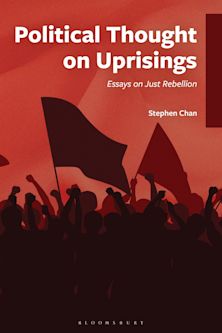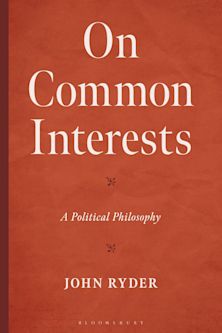- Home
- ACADEMIC
- Politics & International Relations
- Political Theory and Philosophy
- The Politics of Affective Relations
The Politics of Affective Relations
East Asia and Beyond
Daniel A. Bell (Anthology Editor) , Hahm Chiahark (Anthology Editor) , Daniel A. Bell (Contributor) , Hahm Chaihark (Contributor) , Joseph Chan (Contributor) , Sin Yee Chan (Contributor) , Ruiping Fan (Contributor) , Tatiana Yu. Danilchenko (Contributor) , Sung Ho Kim (Contributor) , Shaomin Li (Contributor) , Randall Peerenboom (Contributor) , Hoyt Cleveland Tillman (Contributor) , Jane K. Winn (Contributor) , David B. Wong (Contributor) , R. Bin Wong (Contributor) , Liang Zhiping (Contributor)
The Politics of Affective Relations
East Asia and Beyond
Daniel A. Bell (Anthology Editor) , Hahm Chiahark (Anthology Editor) , Daniel A. Bell (Contributor) , Hahm Chaihark (Contributor) , Joseph Chan (Contributor) , Sin Yee Chan (Contributor) , Ruiping Fan (Contributor) , Tatiana Yu. Danilchenko (Contributor) , Sung Ho Kim (Contributor) , Shaomin Li (Contributor) , Randall Peerenboom (Contributor) , Hoyt Cleveland Tillman (Contributor) , Jane K. Winn (Contributor) , David B. Wong (Contributor) , R. Bin Wong (Contributor) , Liang Zhiping (Contributor)
You must sign in to add this item to your wishlist. Please sign in or create an account
Description
In The Politics of Affective Relations, editors Daniel Bell and Hahm Chaihark refine our understanding of the East Asian conception of the self by examining how that conception was formulated, reproduced, and utilized throughout history. Sparked by a strong dissatisfaction with the state over many discourses regarding East Asian politics, this volume moves beyond the simplistic exchange of polemics regarding "Asian Values" and reaches a more nuanced understanding of "relationality." By bringing together a collection of articles authored by experts in a variety of academic disciplines, Bell and Hahm scrutinize how the East Asian emphasis on "relationality" manifests itself in various real-life settings such as the family, the economy, politics, and the legal system. This volume will provide readers with a broader perspective on and a deeper appreciation for the pervasive nature of "relationality" in East Asia.
Table of Contents
2 Part I:Toward a Political Theory of Affective Relations
3 Confucian Perspectives on Pluralism, Gender Equality, and the Family
4 Confucianism and the Public Sphere: Five Relationships Plus One?
5 Exploring the Non-familial in Confucian Political Philosophy
6 Is a Confucian Family-Oriented Civil Society Possible?
7 The Personal is Political: Confucianism and Liberal Feminism
8 Part II:Probing the History of Affective Relations
9 Selected Confucian Networks and Values in Society and the Economy
10 The Political Ambiguity of Voluntary Associations: Chinese Forms of Civic Possibility, Past and Present
11 Rethinking Civil Society in China: An Interpretative Approach
12 Democracy in Korea and the Myth of Civil Society
13 Part III: Locating Affective Relations in Institutional Contexts
14 From Relations to Rules: A Theoretical Explanation and Empirical Evidence
15 Social Networks, Electronic Commerce and Economic Liberalization in China
16 Social Networks, Civil Society, Democracy and Rule of Law: A New Conceptual Framework
17 Negotiating Confucian Civility Through Constitutional Discourse
Product details
| Published | 24 Aug 2004 |
|---|---|
| Format | Ebook (Epub & Mobi) |
| Edition | 1st |
| Extent | 346 |
| ISBN | 9780739159200 |
| Imprint | Lexington Books |
| Series | Global Encounters: Studies in Comparative Political Theory |
| Publisher | Bloomsbury Publishing |
About the contributors
Reviews
-
This book brings the study of Confucian values fully into current-day social science scholarship.It draws on the appropriate disciplinary studies, examines long-term change in Chinese and Korean societies through solid evidence, and refrains from both idealizing East Asian ways and assuming that they are disappearing in favor of Western practices. More than other sources, it explains how and why approaches to human relations in this region continue to have distinctive features.
Gilbert Rozman, Princeton University



































